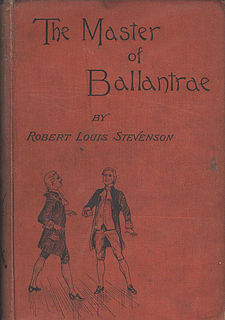
"Matty Groves", also known as "Little Musgrave and Lady Barnard" or "Little Musgrave", is a ballad probably originating in Northern England that describes an adulterous tryst between a young man and a noblewoman that is ended when the woman's husband discovers and kills them. This song exists in many textual variants and has several variant names. The song dates to at least 1613, and under the title Little Musgrave and Lady Barnard is one of the Child Ballads collected by 19th-century American scholar Francis James Child.
"The Raggle Taggle Gypsy", is a traditional folk song that originated as a Scottish border ballad, and has been popular throughout Britain, Ireland and North America. It concerns a rich lady who runs off to join the gypsies. Common alternative names are "Gypsy Davy", "The Raggle Taggle Gypsies O", "The Gypsy Laddie(s)", "Black Jack David" and "Seven Yellow Gypsies".

The Master of Ballantrae: A Winter's Tale is an 1889 novel by the Scottish author Robert Louis Stevenson, focusing upon the conflict between two brothers, Scottish noblemen whose family is torn apart by the Jacobite rising of 1745. He worked on the book in Tautira after his health was restored.
"Captain Wedderburn's Courtship" is an old Scottish ballad dating from 1785 or earlier. It is Child Ballad #46, Roud 36. It is known by a number of titles, including "Lord Roslin's Daughter" and "The Laird of Rosslyn's Daughter".
Catskin is an English fairy tale collected by Joseph Jacobs, in More English Fairy Tales. Marian Roalfe Cox, in her pioneering study of Cinderella, identified as one of the basic types, the Unnatural Father, contrasting with Cinderella itself and Cap O' Rushes.
"Geordie" is Child ballad 209, existing in many variants. Versions of the ballad have been sung by traditional folksingers in Scotland, Italy, England, Ireland, Canada and the United States, and performed and recorded by numerous artists and groups. The ballad concerns the trial of the eponymous hero, during which his wife pleads for his life.

"Young Beichan" is a ballad, which with a number of variants and names such as "Lord Baker", "Lord Bateman", and "Young Bekie", was collected by Francis James Child in the late 19th century, and is included in the Child ballad as number 53.
The Laird O Logie or The Laird Of Logie is Child ballad number 182.
"The Bonny Hind" is Child ballad number 50.
Lizie Lindsay is Child ballad 226, existing in several variants.
"The Cruel Brother" is Child ballad 11 and Roud #26.
The Knight's Ghost is Child ballad 265. It tells the story of a woman who learns that her husband has died in battle, after which she locks his men in a cellar and throws the keys in the sea. Her husband's ghost appears to ask that she release his men, assuring her they fought bravely. Francis Child drew the ballad from Buchan's Ballads of the North of Scotland.
"Andrew Lammie" is Child ballad 233. It is said to record a historical event, with the grave of the heroine in the churchyard at Fyvie.
Dick o the Cow is Child ballad 185 and a border ballad. The ballad tells the story of a man who regains his stolen cows.
Lord Thomas Stuart is Child ballad 259.
Will Stewart and John is Child ballad 107, indexed as such in Francis James Child's 19th century collection of English and Scottish ballads.
"The Trees They Grow So High" is a British folk song. The song is known by many titles, including "The Trees They Do Grow High", "Daily Growing", "Long A-Growing" and "Lady Mary Ann".
"The Dowie Dens of Yarrow", also known as "The Braes of Yarrow" or simply "Yarrow", is a Scottish border ballad. It has many variants and it has been printed as a broadside, as well as published in song collections. It is considered to be a folk standard, and many different singers have performed and recorded it.
The (Bonnie) Rantin' Laddie or Lord Aboyne is a traditional Scottish folk ballad telling of the valiant rescue of his lover by a noble Highland lord.
Thomas o Yonderdale is Child ballad number 253; Roud number 3890. Child assessed that this "apocryphal" ballad seemed like a recent fabrication from a pastiche of other ballads.


